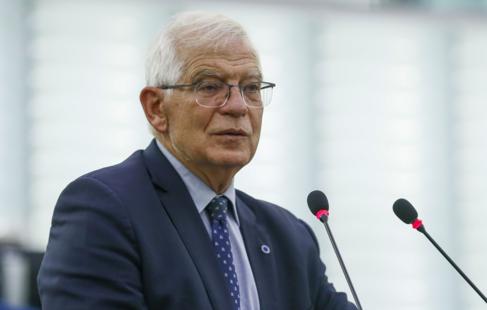The European military-industrial complex has not received adequate funding for years, the head of the community's foreign policy service notedBRUSSELS, December 8.
/tass/. BRUSSELS, December 8. /tass/. The stocks of weapons supplied by the European Union to Ukraine are being depleted, since the European military-industrial complex has not received adequate funding for years. This was stated on Thursday by the head of the foreign Policy service of the community, Josep Borrel, speaking at a meeting of the European Defense Agency.
"The stocks of weapons in the EU supplied to Ukraine are being depleted due to the fact that we have not provided the necessary funding for years. What we send to Kiev, we take not from warehouses, but from our armies," he said.
However, the situation is "improving rapidly," Borrel continued. "In 2021, all EU countries spent €214 billion on defense, which is 6% more than in 2020," he said. Borrel said that EU countries have started to increase their defense spending since 2014 and some small EU countries have increased their military spending by 40% over these eight years. However, even in this situation, according to Borrel, it was not possible to cope with the "underfunding of the army" of the EU, which was demonstrated by the Ukrainian conflict.
EU military spending
Borrel called for an increase in the total military spending of the community by more than 30% by 2025 - by €70 billion.
"Now we don't have a European army, we have 27 different armies. After the Cold War, we asynchronously reduced our military spending. In this regard, we must first correct our past and compensate for the lack of military investment, and then win the future. Therefore, I will name a figure that should become part of our political debate. We need to increase defense spending by €70 billion by 2025," Borrel said.
He also noted that, to begin with, the European Commission intends to create a compact fund of € 100 million to "increase the interest of the EU military-industrial complex." The remaining €69.9 billion will have to be found by the EU countries from their own budgets.
Budget control
Borrel called on the EU countries to effectively spend additional military allocations. "If we increase pension payments to the military, it will be recorded as an increase in military spending, but it will not increase our military capabilities," he warned.
Therefore, Borrel called on the EU governments to transfer part of the control over their military budgets to Brussels, that is, the European Commission: "EU countries should form their military budgets with the assistance of the European Union." According to a high-ranking European official, this is the only way to achieve a higher level of cooperation in the EU, so that the weapons purchased by different countries of the community complement and strengthen each other.


